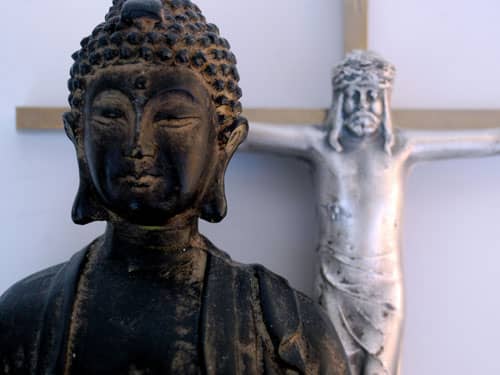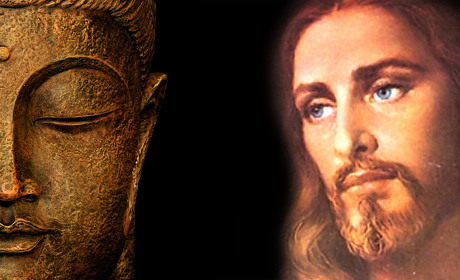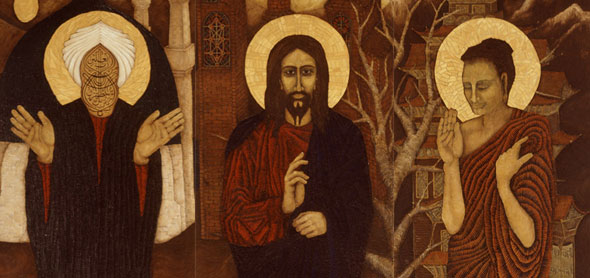Buddhism and Christianity
The Christian- Buddhist dialogue is initially the main problem that Buddhism recognizes no creator God, while Christianity just such presupposes. Nevertheless, at various levels fruitful connections between Christianity and Buddhism have shown.
Practical level
As Buddhism rejects the idea of a Creator God, Christianity and Buddhism in their goals are seemingly unbridgeable separated. But on the other hand, this separation in turn allows a connection because the Buddhist method of meditation can be used by many Christians just because of a lack of Buddhist dogmatics as a mere means to a Christian spiritual path. The originating from the Buddhist meditation methods, in particular the Zen, fill here seems to be a perceived deficit in the Christian tradition, whose own meditative practices (Jesus prayer, lectio divina, Serenity prayer by Cassian, Scripture Meditation by St. Ignatius of Loyola ) seemed to be forgotten for some time. An example of how far this connection can go between Buddhism and Christianity, but also which problem this, the Benedictine monk and Zen master Willigis hunter who has received from the Catholic side, a ban on teaching, as well as the Jesuit priest and Zen master Hugo Makibi are Enomiya - Lassalle.
Mention will also be the part very intensive contacts between Buddhist and Christian monks. At least since the early eighties, the exchange is common here. In German-speaking here Archabbey Saint Ottilia plays a special role. Here are what binds both to a similar lifestyle as well as similar experiences. Among the pioneers at the international level was one of the Trappist and mystic Thomas Merton.
Theoretical, scientific level
Another, more philosophical connection is given by the Christian mystic Meister Eckhart. In his negative theology transcends the personal Christian image of God to an unrecognizable One, which he referred to it as nothing, as in the following quotation from the Sermon 42 (after the fifth count ): "Thou shalt love him as he is a non - God, a no-mind, a non- person, a non-image, more, as it is a pure, pure, clear one, separated from all duality. And in this One we should eternally sink from Something for Nothing. To this end, God verhelfe us. Amen. "
In the negative theology of Meister Eckhart can be many factual parallels to Buddhist teachings produce, particularly the nothingness of negative theology to the Buddhist emptiness. The Christian religious philosopher Bernhard Welte notes that " waving " as it were about Meister Eckhart Christianity and Buddhism. Especially with the two Japanese religious philosopher Shizuteru Ueda and Daisetz Teitaro Suzuki has taken place at the scientific level, a Christian- Buddhist dialogue on Meister Eckhart.
Possible historical connection and influence
There can be some arguments cite that Buddhism already in history had an impact on the Western, Greek philosophy was known or at least there:
- By Alexander the Great came into the bordering India rich Bactria and Gandhara had a fruitful meeting and mutual influence of Greek and Indian culture and philosophy in the so-called Graeco- Buddhism.
- The ancient Egyptian Alexandria was on the one hand as the capital of the Greek Ptolemaic Empire, the towering intellectual center in the centuries around the time of Christ. The Alexandrian School was the first university in the modern sense, and possessed with the Library of Alexandria about the best library of antiquity. In addition, Alexandria was also an economic metropolis. In particular, the India trade received a new impetus, as the Alexandrian Harpalus at the time around around the monsoon winds and their influence on the boat trip to India, described at the University of Alexandria. By trading also the philosophical and religious teachings spread.
- The Ptolemaic rulers of Alexandria sought to equip its library not only with Greek works, but with the texts of all peoples and cultures. It is reported that Ptolemy I sent a letter to all the kings and rulers of the earth written and had asked her to send him the works of any author: " poets and prose writers, rhetoricians and sophists, doctors and soothsayers, historians and everybody else ". From Ptolemy III. , A contemporary of the Indian Emperor Ashoka, it is known that he even gave the command to search all incoming vessels to confiscate the books it found, to let them write off and the owners finally hand over the copy instead of the original.
- On the other hand, the Indian Emperor Ashoka was the one who was responsible for the spread of Buddhism even beyond his empire beyond. In his XIII. Be rock edict except five Indian ruler called by which the emperor was in touch: Antiochus II of Syria, Ptolemy II of Egypt, Antigonus of Macedonia, Magas of Cyrene and Alexander of Epirus.
- As Plotinus, the real founder of Neo-Platonism, left after the death of his teacher Alexandria, he joined the report of his disciple Porphyry, according to a perilous Roman expedition to Persia, know each other better with the express desire to Persian and Indian philosophy. The campaign failed, however, and Plotinus founded in Rome after his philosophical school.
- Designed by Plotinus, Neoplatonism with its mystical transcendence of thought, in which the A is carried out, is alien to this point, the previous Greek philosophy, on the other hand " the mood of Indian philosophy deeply congenial to ".
Should have given this historic Indian and Buddhist influences on Greek philosophy, especially Neoplatonism and about the negative Christian theology would be affected. It would be an indication that the spiritual closeness of Meister Eckhart fails to Buddhism purely coincidental.










